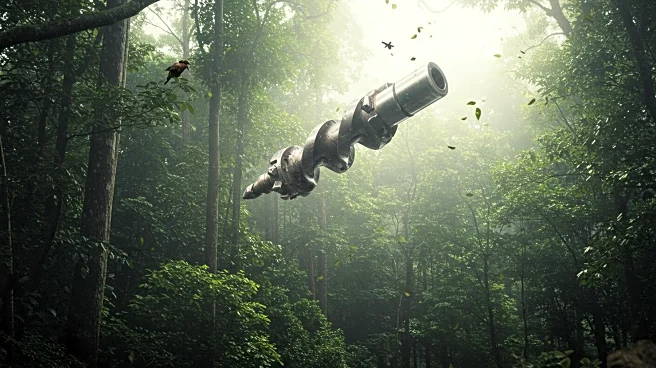What is the story about?
What's Happening?
Green Light Wisconsin has initiated drilling operations to explore copper and gold deposits in the Chequamegon-Nicolet National Forest. The company is focusing on the Bend deposit in Taylor County, which is believed to contain approximately 4.2 million tons of copper and gold. The exploration is in its early stages, with the company drilling six holes up to 1,000 feet deep. This marks the first metallic mining exploration in Wisconsin since a similar project five years ago. The company aims to expand its exploration to include tellurium, a rare metalloid used in electronics and solar panels. Despite the potential for economic benefits, the project has raised concerns among environmentalists and local tribes about possible water contamination and impacts on cultural sites.
Why It's Important?
The drilling project by Green Light Wisconsin is significant due to its potential impact on domestic energy production and the clean energy transition, given the metals involved. However, it also poses environmental risks, particularly concerning water contamination from sulfide minerals. The project has sparked opposition from environmental groups and tribes, who fear negative effects on groundwater, wetlands, and cultural sites. The controversy highlights the ongoing debate between economic development and environmental protection, especially in sensitive areas like northern Wisconsin. The outcome of this project could set precedents for future mining operations in the region.
What's Next?
Green Light Wisconsin plans to continue drilling through August and has applied for a prospecting permit to explore additional sites. The company aims to prove the viability of mining operations in northern Wisconsin, potentially leading to a regional mill operation. However, any mining development is years away and would require extensive environmental studies and regulatory approvals. The Wisconsin Department of Natural Resources and federal agencies are involved in monitoring and reviewing the project, with environmental groups calling for more comprehensive assessments. The project's progression will depend on balancing economic interests with environmental and cultural considerations.
Beyond the Headlines
The drilling project raises broader questions about the balance between resource extraction and environmental stewardship. The repeal of Wisconsin's sulfide mining moratorium in 2017 has opened the door for such projects, but it also underscores the need for robust environmental safeguards. The involvement of tribal groups highlights the importance of respecting cultural heritage and treaty rights in land use decisions. As the clean energy transition accelerates, the demand for rare metals will increase, potentially leading to more conflicts between mining interests and environmental protection.















